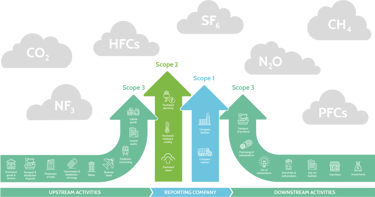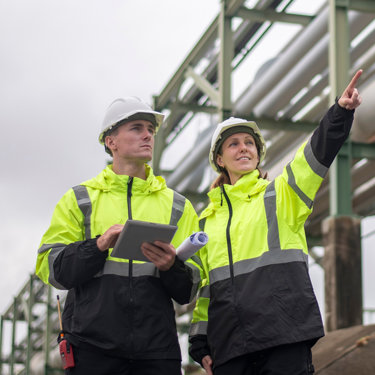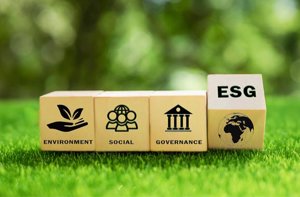
Net Zero carbon consultants
Ready to discuss your project?
Please leave your details and a member of our team will reach out to discuss your requirements in more detail and arrange next steps.
We work with organisations to meet their Net-Zero targets by firstly measuring their baseline carbon footprint, we create Net-Zero strategies in line with Science Based Targets, prepare business cases for investment, identify funding opportunities, and provide advice on carbon offsetting.
Reducing carbon emissions will have added benefits from energy, fuel, and efficiency savings to reducing operating costs and future proofing against upcoming changes in legislation.
Our experts understand that all organisations are different, and any approach must be tailored.
What is Net-Zero
Net-Zero means cutting GHG emissions to as close to zero as possible, with any remaining emissions re-absorbed from the atmosphere, ideally through the natural environment (trees, oceans, soils etc.).
To keep global warming to no more than 1.5°C – as called for in the Paris Agreement – emissions need to be reduced by 45% by 2030 and reach net zero by 2050.
More than 3,000 businesses and financial institutions are working with the Science-Based Targets Initiative to reduce their emissions in line with climate science.
Benefits
- Compliance with regulations and best practice reporting standards.
- Demonstrate commitment to the environment to investors and stakeholders.
- Comply with PPN06/21 Mandatory Carbon Reduction Plan for public sector contracts over £5m.
- Identify energy, fuel, efficiency savings, and reduce operating costs.
- Future-proof your business against volatile fossil-fuel energy markets.
- Enhance ESG performance and gain competitive advantage.
Added value
Experience
In-house ecologists
Expert advice
Capability
Recommendations

Blue carbon
Measuring and enhancing carbon sequestration in marine and freshwater environments.
Carbon baseline foot printing
You can’t reduce your carbon footprint unless you know what it is. A GHG footprint will help you to understand your organisation’s current emissions, giving you a baseline to measure improvement from.
This might be required for legislation such as SECR or PPN 06/21 for public sector contracts, or it may be voluntary as part of your organisation’s ESG targets.
The Greenhouse Gas Protocol
Scope 1, Scope 2, and Scope 3 is a classification system for GHG emissions an organisation generates through its direct operations, energy and resource consumption, and the wider supply chain.
The Greenhouse Gas Protocol classifies emissions based on where they originated from.
- Scope 1 emissions are generated from fuels burned directly by an organisation in its own buildings, vehicles or equipment
- Scope 2 includes emissions generated from purchased energy from the grid.
Scope 3 emissions are all those emissions a firm is responsible for but which happen outside of its walls and are controlled by other parties up and down the value chain.

Carbon auditing
Our experts can perform a series of energy and carbon audits of your organisation’s Scope, 1, Scope 2 and Scope 3 emissions, mapping out all the activities a business performs and the energy consumption in those areas.
This gives you a carbon footprint of your organisation and supply chain. You can now go on to develop a Net-Zero strategy to reduce your organisation’s carbon emissions.
Net-Zero Strategy and Action Plan
Once you have an accurate understanding of your organisations carbon footprint and the key emissions sources, the next step is to set a carbon reduction target. Adopting a science-based target means that your emissions reductions will meet, or exceed, the requirements of the Paris Agreement and, therefore, play your part in preventing the worst possible impacts of climate change.
To achieve the Science-Based Target, a detailed Net-Zero roadmap is developed. Our experts will explore all opportunities to reduce emissions across your organisation, establish the feasibility and effectiveness, model and prioritise recommendations. This could include the feasibility of on-site renewable energy generation, renewable energy procurement, electric and zero emissions vehicles, energy storage, resource efficiency and responsible procurement.
We will calculate potential savings against the Scope 1, 2 and 3 emissions and work out how to how to quantify giving you a cost / benefit analysis. We can also support with accessing available funding to achieve your goals.
Once implemented, we can support you to quantify and verify your emissions savings. By calculating absolute carbon emissions and key performance indicators (KPIs), we can assess progress towards your reductions targets over time.
Carbon offsetting
Carbon offsetting is not a replacement for a genuine reduction in emissions based on Science-Based Targets. However, as part of any Net-Zero plan, some form of carbon offsetting will likely be required as part of a phased approach. It is not expected that every organisation can eliminate all of its emissions immediately, and some areas of the supply chain will not be decarbonised for many years to come.
To compensate for these residual emissions, an organisation can invest in carbon offsets (wind, solar etc.) or nature-based solutions (tree planting, rainforest conservation, peatland restoration etc). There are hundreds of carbon offsetting options and it can be hard to know where to start.
Our experts will guide you through the process, identify your budget and values and find a project which matches your specific requirements. We can identify and review multiple options and provide risk assessments of all, allowing you to make the best choice for your organisation.
Nature-Based Solutions
Natural sequestration is removal of carbon by a natural process and is a type of carbon offsetting. Unlike carbon capture it links to conservation first, with intervention second. We work with local authorities or organisations such as water companies who want to build natural sequestration carbon offsetting programmes on their land.
Our ecologists map habitats and audit them to see what carbon they sequester or store, and build data sets to understand their effectiveness. Through predictive habitat modelling, we can identify if the habitat is suitable and offer monitoring and validation services to prove effectiveness as a carbon offset method.
You might also be interested in...
Environmental compliance today, creating a sustainable tomorrow
Helping you reduce risk to the environment and your operation by managing assets compliantly while achieving commercial, ESG, and net-zero goals.
Contact our experts


